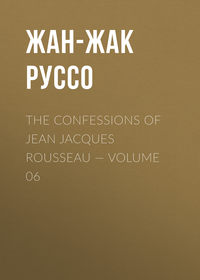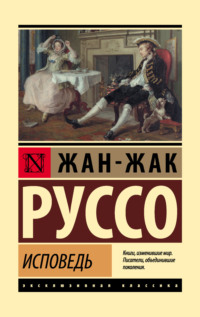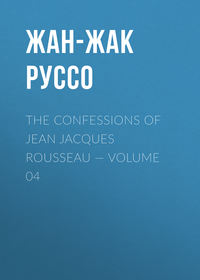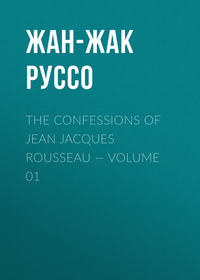 полная версия
полная версияThe Confessions of Jean Jacques Rousseau — Volume 11
Besides the Abbe de Bouffiers, by whom I was not beloved, and Madam de Bouffiers, in whose opinion I was guilty of that which neither women nor authors ever pardon, the other friends of Madam de Luxembourg never seemed much disposed to become mine, particularly the President Henault, who, enrolled amongst authors, was not exempt from their weaknesses; also Madam du Deffand, and Mademoiselle de Lespinasse, both intimate with Voltaire and the friends of D'Alembert, with whom the latter at length lived, however upon an honorable footing, for it cannot be understood I mean otherwise. I first began to interest myself for Madam du Deffand, whom the loss of her eyes made an object of commiseration in mine; but her manner of living so contrary to my own, that her hour of going to bed was almost mine for rising; her unbounded passion for low wit, the importance she gave to every kind of printed trash, either complimentary or abusive, the despotism and transports of her oracles, her excessive admiration or dislike of everything, which did not permit her to speak upon any subject without convulsions, her inconceivable prejudices, invincible obstinacy, and the enthusiasm of folly to which this carried her in her passionate judgments; all disgusted me and diminished the attention I wished to pay her. I neglected her and she perceived it; this was enough to set her in a rage, and, although I was sufficiently aware how much a woman of her character was to be feared, I preferred exposing myself to the scourge of her hatred rather than to that of her friendship.
My having so few friends in the society of Madam de Luxembourg would not have been in the least dangerous had I had no enemies in the family. Of these I had but one, who, in my then situation, was as powerful as a hundred. It certainly was not M. de Villeroy, her brother; for he not only came to see me, but had several times invited me to Villeroy; and as I had answered to the invitation with all possible politeness and respect, he had taken my vague manner of doing it as a consent, and arranged with Madam de Luxembourg a journey of a fortnight, in which it was proposed to me to make one of the party. As the cares my health then required did not permit me to go from home without risk, I prayed Madam de Luxembourg to have the goodness to make my apologies. Her answer proves this was done with all possible ease, and M. de Villeroy still continued to show me his usual marks of goodness. His nephew and heir, the young Marquis of Villeroy, had not for me the same benevolence, nor had I for him the respect I had for his uncle. His harebrained manner rendered him insupportable to me, and my coldness drew upon me his aversion. He insultingly attacked me one evening at table, and I had the worst of it because I am a fool, without presence of mind; and because anger, instead of rendering my wit more poignant, deprives me of the little I have. I had a dog which had been given me when he was quite young, soon after my arrival at the Hermitage, and which I had called Duke. This dog, not handsome, but rare of his kind, of which I had made my companion and friend, a title which he certainly merited much more than most of the persons by whom it was taken, became in great request at the castle of Montmorency for his good nature and fondness, and the attachment we had for each other; but from a foolish pusillanimity I had changed his name to Turk, as if there were not many dogs called Marquis, without giving the least offence to any marquis whatsoever. The Marquis of Villeroy, who knew of the change of name, attacked me in such a manner that I was obliged openly at table to relate what I had done. Whatever there might be offensive in the name of duke, it was not in my having given but in my having taken it away. The worst of it all was, there were many dukes present, amongst others M. de Luxembourg and his son; and the Marquis de Villeroy, who was one day to have, and now has the title, enjoyed in the most cruel manner the embarrassment into which he had thrown me. I was told the next day his aunt had severely reprimanded him, and it may be judged whether or not, supposing her to have been serious, this put me upon better terms with him.
To enable me to support his enmity I had no person, neither at the Hotel de Luxembourg nor at the Temple, except the Chevalier de Lorenzy, who professed himself my friend; but he was more that of D'Alembert, under whose protection he passed with women for a great geometrician. He was more, over the cicisbe, or rather the complaisant chevalier of the Countess of Boufflers, a great friend also to D'Alembert, and the Chevalier de Lorenzy was the most passive instrument in her hands. Thus, far from having in that circle any counter-balance to my inaptitude, to keep me in the good graces of Madam de Luxembourg, everybody who approached her seemed to concur in injuring me in her good opinion. Yet, besides Emilius, with which she charged herself, she gave me at the same time another mark of her benevolence, which made me imagine that, although wearied with my conversation, she would still preserve for me the friendship she had so many times promised me for life.
As soon as I thought I could depend upon this, I began to ease my heart, by confessing to her all my faults, having made it an inviolable maxim to show myself to my friends such as I really was, neither better nor worse. I had declared to her my connection with Theresa, and everything that had resulted from it, without concealing the manner in which I had disposed of my children. She had received my confessions favorably, and even too much so, since she spared me the censures I so much merited; and what made the greatest impression upon me was her goodness to Theresa, making her presents, sending for her, and begging her to come and see her, receiving her with caresses, and often embracing her in public. This poor girl was in transports of joy and gratitude, of which I certainly partook; the friendship Madam de Luxembourg showed me in her condescensions to Theresa affected me much more than if they had been made immediately to myself.
Things remained in this state for a considerable time; but at length Madam de Luxembourg carried her goodness so far as to have a desire to take one of my children from the hospital. She knew I had put a cipher into the swaddling clothes of the eldest; she asked me for the counterpart of the cipher, and I gave it to her. In this research she employed La Roche, her valet de chambre and confidential servant, who made vain inquiries, although after only about twelve or fourteen years, had the registers of the foundling hospital been in order, or the search properly made, the original cipher ought to have been found. However this may be, I was less sorry for his want of success than I should have been had I from time to time continued to see the child from its birth until that moment. If by the aid of the indications given, another child had been presented as my own, the doubt of its being so in fact, and the fear of having one thus substituted for it, would have contracted my affections, and I should not have tasted of the charm of the real sentiment of nature. This during infancy stands in need of being supported by habit. The long absence of a child whom the father has seen but for an instant, weakens, and at length annihilates paternal sentiment, and parents will never love a child sent to nurse, like that which is brought up under their eyes. This reflection may extenuate my faults in their effects, but it must aggravate them in their source.
It may not perhaps be useless to remark that by the means of Theresa, the same La Roche became acquainted with Madam le Vasseur, whom Grimm still kept at Deuil, near La Chevrette, and not far from Montmorency.
After my departure it was by means of La Roche that I continued to send this woman the money I had constantly sent her at stated times, and I am of opinion he often carried her presents from Madam de Luxembourg; therefore she certainly was not to be pitied, although she constantly complained. With respect to Grimm, as I am not fond of speaking of persons whom I ought to hate, I never mentioned his name to Madam de Luxembourg, except when I could not avoid it; but she frequently made him the subject of conversation, without telling me what she thought of the man, or letting me discover whether or not he was of her acquaintance. Reserve with people I love and who are open with me being contrary to my nature, especially in things relating to themselves, I have since that time frequently thought of that of Madam de Luxembourg; but never, except when other events rendered the recollection natural.
Having waited a long time without hearing speak of Emilius, after I had given it to Madam de Luxembourg, I at last heard the agreement was made at Paris, with the bookseller Duchesne, and by him with Neaulme, of Amsterdam. Madam de Luxembourg sent me the original and the duplicate of my agreement with Duchesne, that I might sign them. I discovered the writing to be by the same hand as that of the letters of M. de Malesherbes, which he himself did not write. The certainty that my agreement was made by the consent, and under the eye of that magistrate, made me sign without hesitation. Duchesne gave me for the manuscript six thousand livres(two hundred and fifty pounds), half in specie, and one or two hundred copies. After having signed the two parts, I sent them both to Madam de Luxembourg, according to her desire; she gave one to Duchesne, and instead of returning the other kept it herself, so that I never saw it afterwards.
My acquaintance with M. and Madam de Luxembourg, though it diverted me a little from my plan of retirement, did not make me entirely renounce it. Even at the time I was most in favor with Madam de Luxembourg, I always felt that nothing but my sincere attachment to the marechal and herself could render to me supportable the people with whom they were connected, and all the difficulty I had was in conciliating this attachment with a manner of life more agreeable to my inclination, and less contrary to my health, which constraint and late suppers continually deranged, notwithstanding all the care taken to prevent it; for in this, as in everything else, attention was carried as far as possible; thus, for instance, every evening after supper the marechal, who went early to bed, never failed, notwithstanding everything that could be said to the contrary, to make me withdraw at the same time. It was not until some little time before my catastrophe that, for what reason I know not, he ceased to pay me that attention. Before I perceived the coolness of Madam de Luxembourg, I was desirous, that I might not expose myself to it, to execute my old project; but not having the means to that effect, I was obliged to wait for the conclusion of the agreement for 'Emilius', and in the time I finished the 'Social Contract', and sent it to Rey, fixing the price of the manuscript at a thousand livres (forty-one pounds), which he paid me.
I ought not perhaps to omit a trifling circumstance relative to this manuscript. I gave it, well sealed up, to Du Voisin, a minister in the pays de Vaud and chaplain at the Hotel de Hollande, who sometimes came to see me, and took upon himself to send the packet to Rey, with whom he was connected. The manuscript, written in a small letter, was but very trifling, and did not fill his pocket. Yet, in passing the barriere, the packet fell, I know not by what means, into the hands of the Commis, who opened and examined it, and afterwards returned it to him, when he had reclaimed it in the name of the ambassador. This gave him an opportunity of reading it himself, which he ingeniously wrote me he had done, speaking highly of the work, without suffering a word of criticism or censure to escape him; undoubtedly reserving to himself to become the avenger of Christianity as soon as the work should appear. He resealed the packet and sent it to Rey. Such is the substance of his narrative in the letter in which he gave an account of the affair, and is all I ever knew of the matter.
Besides these two books and my dictionary of music, at which I still did something as opportunity offered, I had other works of less importance ready to make their appearance, and which I proposed to publish either separately or in my general collection, should I ever undertake it. The principal of these works, most of which are still in manuscript in the hands of De Peyrou, was an essay on the origin of Languages, which I had read to M. de Malesherbes and the Chevalier de Lorenzy, who spoke favorably of it. I expected all the productions together would produce me a net capital of from eight to ten thousand livres (three to four hundred pounds), which I intended to sink in annuities for my life and that of Theresa; after which, our design, as I have already mentioned, was to go and live together in the midst of some province, without further troubling the public about me, or myself with any other project than that of peacefully ending my days and still continuing to do in my neighborhood all the good in my power, and to write at leisure the memoirs which I intended.
Such was my intention, and the execution of it was facilitated by an act of generosity in Rey, upon which I cannot be silent. This bookseller, of whom so many unfavorable things were told me in Paris, is, notwithstanding, the only one with whom I have always had reason to be satisfied. It is true, we frequently disagreed as to the execution of my works. He was heedless and I was choleric; but in matters of interest which related to them, although I never made with him an agreement in form, I always found in him great exactness and probity. He is also the only person of his profession who frankly confessed to me he gained largely by my means; and he frequently, when he offered me a part of his fortune, told me I was the author of it all. Not finding the means of exercising his gratitude immediately upon myself, he wished at least to give me proofs of it in the person of my governante, upon whom he settled an annuity of three hundred livres (twelve pounds), expressing in the deed that it was an acknowledgment for the advantages I had procured him. This he did between himself and me, without ostentation, pretension, or noise, and had not I spoken of it to anybody, not a single person would ever have known anything of the matter. I was so pleased with this action that I became attached to Rey, and conceived for him a real friendship. Sometime afterwards he desired I would become godfather to one of his children; I consented, and a part of my regret in the situation to which I am reduced, is my being deprived of the means of rendering in future my attachment of my goddaughter useful to her and her parents. Why am I, who am so sensible of the modest generosity of this bookseller, so little so of the noisy eagerness of many persons of the highest rank, who pompously fill the world with accounts of the services they say they wished to render me, but the good effects of which I never felt? Is it their fault or mine? Are they nothing more than vain; is my insensibility purely ingratitude? Intelligent reader weigh and determine; for my part I say no more.
This pension was a great resource to Theresa and considerable alleviation to me, although I was far from receiving from it a direct advantage, any more than from the presents that were made her.
She herself has always disposed of everything. When I kept her money I gave her a faithful account of it, without ever applying any part of the deposit to our common expenses, not even when she was richer than myself. "What is mine is ours," said I to her; "and what is thine is thine." I never departed from this maxim. They who have had the baseness to accuse me of receiving by her hands that which I refused to take with mine, undoubtedly judged of my heart by their own, and knew but little of me. I would willingly eat with her the bread she should have earned, but not that she should have had given her. For a proof of this I appeal to herself, both now and hereafter, when, according to the course of nature, she shall have survived me. Unfortunately, she understands but little of economy in any respect, and is, besides, careless and extravagant, not from vanity nor gluttony, but solely from negligence. No creature is perfect here below, and since the excellent qualities must be accompanied with some detects; I prefer these to vices; although her defects are more prejudicial to us both. The efforts I have made, as formerly I did for mamma, to accumulate something in advance which might some day be to her a never-failing resource, are not to be conceived; but my cares were always ineffectual.
Neither of these women ever called themselves to an account, and, notwithstanding all my efforts, everything I acquired was dissipated as fast as it came. Notwithstanding the great simplicity of Theresa's dress, the pension from Rey has never been sufficient to buy her clothes, and I have every year been under the necessity of adding something to it for that purpose. We are neither of us born to be rich, and this I certainly do not reckon amongst our misfortunes.
The 'Social Contract' was soon printed. This was not the case with 'Emilius', for the publication of which I waited to go into the retirement I meditated. Duchesne, from time to time, sent me specimens of impression to choose from; when I had made my choice, instead of beginning he sent me others. When, at length, we were fully determined on the size and letter, and several sheets were already printed off, on some trifling alteration I made in a proof, he began the whole again; and at the end of six months we were in less forwardness than on the first day. During all these experiments I clearly perceived the work was printing in France as well as in Holland, and that two editions of it were preparing at the same time. What could I do? The manuscript was no longer mine. Far from having anything to do with the edition in France, I was always against it; but since, at length, this was preparing in spite of all opposition, and was to serve as a model to the other, it was necessary I should cast my eyes over it and examine the proofs, that my work might not be mutilated. It was, besides, printed so much by the consent of the magistrate, that it was he who, in some measure, directed the undertaking; he likewise wrote to me frequently, and once came to see me and converse on the subject upon an occasion of which I am going to speak.
Whilst Duchesne crept like a snail, Neaulme, whom he withheld, scarcely moved at all. The sheets were not regularly sent him as they were printed. He thought there was some trick in the manoeuvre of Duchesne, that is, of Guy who acted for him; and perceiving the terms of the agreement to be departed from, he wrote me letter after letter full of complaints, and it was less possible for me to remove the subject of them than that of those I myself had to make. His friend Guerin, who at that time came frequently to see my house, never ceased speaking to me about the work, but always with the greatest reserve. He knew and he did not know that it was printing in France, and that the magistrate had a hand in it. In expressing his concern for my embarrassment, he seemed to accuse me of imprudence without ever saying in what this consisted; he incessantly equivocated, and seemed to speak for no other purpose than to hear what I had to say. I thought myself so secure that I laughed at his mystery and circumspection as at a habit he had contracted with ministers and magistrates whose offices he much frequented. Certain of having conformed to every rule with the work, and strongly persuaded that I had not only the consent and protection of the magistrate, but that the book merited and had obtained the favor of the minister, I congratulated myself upon my courage in doing good, and laughed at my pusillanimous friends who seemed uneasy on my account. Duclos was one of these, and I confess my confidence in his understanding and uprightness might have alarmed me, had I had less in the utility of the work and in the probity of those by whom it was patronized. He came from the house of M. Baille to see me whilst 'Emilius' was in the press; he spoke to me concerning it; I read to him the 'Profession of Faith of the Savoyard Vicar', to which he listened attentively and, as it seemed to me with pleasure. When I had finished he said: "What! citizen, this is a part of a work now printing in Paris?"—"Yes," answered I, and it ought to be printed at the Louvre by order of the king."—I confess it," replied he; "but pray do not mention to anybody your having read to me this fragment."
This striking manner of expressing himself surprised without alarming me. I knew Duclos was intimate with M. de Malesherbes, and I could not conceive how it was possible he should think so differently from him upon the same subject.
I had lived at Montmorency for the last four years without ever having had there one day of good health. Although the air is excellent, the water is bad, and this may possibly be one of the causes which contributed to increase my habitual complaints. Towards the end of the autumn of 1767, I fell quite ill, and passed the whole winter in suffering almost without intermission. The physical ill, augmented by a thousand inquietudes, rendered these terrible. For some time past my mind had been disturbed by melancholy forebodings without my knowing to what these directly tended. I received anonymous letters of an extraordinary nature, and others, that were signed, much of the same import. I received one from a counsellor of the parliament of Paris, who, dissatisfied with the present constitution of things, and foreseeing nothing but disagreeable events, consulted me upon the choice of an asylum at Geneva or in Switzerland, to retire to with his family. An other was brought me from M. de ——-, 'president a mortier' of the parliament of ——-, who proposed to me to draw up for this Parliament, which was then at variance with the court, memoirs and remonstrances, and offering to furnish me with all the documents and materials necessary for that purpose.
When I suffer I am subject to ill humor. This was the case when I received these letters, and my answers to them, in which I flatly refused everything that was asked of me, bore strong marks of the effect they had had upon my mind. I do not however reproach myself with this refusal, as the letters might be so many snares laid by my enemies,
[I knew, for instance, the President de——- to be connected with the Encyclopedists and the Holbachiens]
and what was required of me was contrary to the principles from which I was less willing than ever to swerve. But having it within my power to refuse with politeness I did it with rudeness, and in this consists my error.
The two letters of which I have just spoken will be found amongst my papers. The letter from the chancellor did not absolutely surprise me, because I agreed with him in opinion, and with many others, that the declining constitution of France threatened an approaching destruction. The disasters of an unsuccessful war, all of which proceeded from a fault in the government; the incredible confusion in the finances; the perpetual drawings upon the treasury by the administration, which was then divided between two or three ministers, amongst whom reigned nothing but discord, and who, to counteract the operations of each other, let the kingdom go to ruin; the discontent of the people, and of every other rank of subjects; the obstinacy of a woman who, constantly sacrificing her judgment, if she indeed possessed any, to her inclinations, kept from public employment persons capable of discharging the duties of them, to place in them such as pleased her best; everything occurred in justifying the foresight of the counsellor, that of the public, and my own. This, made me several times consider whether or not I myself should seek an asylum out of the kingdom before it was torn by the dissensions by which it seemed to be threatened; but relieved from my fears by my insignificance, and the peacefulness of my disposition, I thought that in the state of solitude in which I was determined to live, no public commotion could reach me. I was sorry only that, in this state of things, M. de Luxembourg should accept commissions which tended to injure him in the opinion of the persons of the place of which he was governor. I could have wished he had prepared himself a retreat there, in case the great machine had fallen in pieces, which seemed much to be apprehended; and still appears to me beyond a doubt, that if the reins of government had not fallen into a single hand, the French monarchy would now be at the last gasp.









